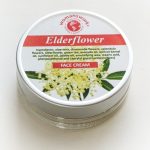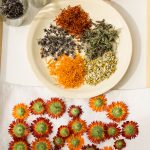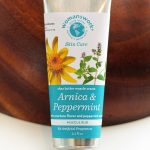designed for the way women work.
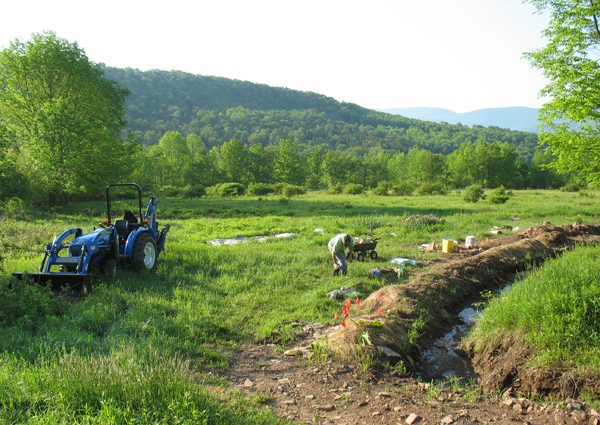
Permaculture in Practise at Dingle Hill Flowers & Herbs
Category: How-To Projects, Plant Ideas & Info, Presenting "The Curious Gardener"
I visited the farm, Dingle Hill Flowers & Herbs, on a sultry August day, my car bumping up a hilly, mile-long stretch of gravel road leading to the former dairy farm, now herb sanctuary, in the Catskill Mountains of NY. Finally I took a sharp turn and headed towards the main farmhouse and the “Heart” of the enterprise, where I met owners Daphne Boss Ayalon and her husband Jerome. Liz Scholl, Womanswork’s master herbalist, who sources herbs from Daphne for our skin care line, was there too.
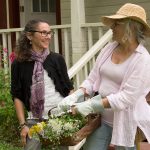
The 100-acre farm has been an exercise in discovery from day one. I interviewed Daphne about her permaculture farming practices and her goals for the farm while we walked through the landscape.
DW: What drew you to this piece of land?
DBA: After the kids left home, Jerome and I decided it was time to leave suburbia and find a place where we could live sustainably on our own piece of land. Our wish list included an easily reachable but remote place, breathtaking scenery, natural habitats, and a source of water. With years of experience in horticulture, design, and gardening, dreams of agriculture swirled in my head.
Until 1970, our property was part of a 400-acre dairy farm. Since then it hasn’t been worked or maintained. Fields were reverting back to their natural state. We live on a 100-hundred acre plot of the original parcel that includes an old farmhouse.
DW: What were some of your earliest discoveries about the property?
DBA: There are many micro climates here and a huge diversity of plants and wildlife, including mushrooms, birds and birds of prey, fowl, mammals, amphibians, and snakes, not to mention insects, and such. We even have a resident river otter, but have yet to find its lodging.
I started living on the farm in October 2012. After studying the immediate surroundings I decided on a place to start a kitchen garden. When clearing the area, to my pleasant surprise I found the remains of an old kitchen garden exactly where I had intended to start mine.
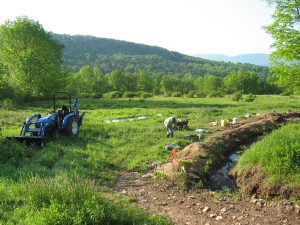
In 2013 I spent most of the season opening up the property, scouting and analyzing and drafting first plans. I was looking for old farm paths to revive and started laying trails. I also built the first hugel at the site of a clogged ditch which had been dug at the bottom of a large heap of stones. The ditch and heap ofstones shelter the area from winds and create a heat pan. Because of the winding layout of the ditch, I call this area “the Heart” and it’s here new ideas and plants are tested.
DW: What is a hugel?
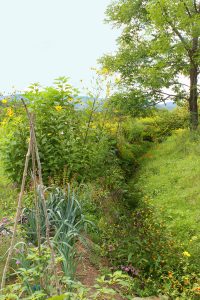
DBA: A hugel is a berm built over buried tree trunks and other organic material. This is a system that builds soil and heats the berm naturally through the internal decomposition of organic matter. The swale catches precipitation and water runoff, minimizing erosion and the need for irrigation. Decomposing wood takes up water like a sponge and retains it for plant roots. It’s a take on the Hugelkultur system envisioned by Austrian farmer Sepp Holzer.
DW: What led you to decide to grow medicinal herbs and to create a sanctuary for them?
DBA: By the end of the 2013 season, after trying out various options and plants, I realized our farm contains the perfect conditions to grow medicinal herbs. Many of these plants once grew here profusely but had been irresponsibly harvested by previous generations.
Maybe my love for long lost civilizations and history drew me to herbs. (I was formerly an archaeologist.) Herbs are an important part of the heritage of all ancient cultures. They were a source of nutrition and medicinal remedies, as well as personal and skin care products. Humans have been acquiring knowledge about herbs for thousands of years. In modern times, extensive research still shows the efficacy of herbs. For me herbs symbolize the connections between past and future.
DW: You follow holistic, permaculture farming practises. Can you please explain what that means?
DBA: When I moved here I had no firm plan, except for a lifelong commitment to natural processes, sustainability, and no-harm practices; my road has taken me to permaculture, old farming traditions, biointensive practices, and beyond-organic methods, and I’m grateful to all the growers and gardeners that have shared their experiences. One example is a complete ban on all pesticides, even those declared “safe” by the organics industry. You can find a good definition of permaculture here: http://www.permaculture.net/about/definitions.html.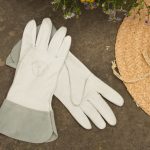
From sowing to harvesting to processing, all activities are done by hand. Machines just don’t have the ability to discern quality. Living with nature means relying on and integrating the resources found around us: soil, water, stone, wood, plants and wildlife.
My focus revolves around taking care of the soil that nourishes life; that’s why growing areas aren’t tilled or cultivated. I use only open-pollinated, straight-species and heirloom plant species that have proven their effectiveness over generations. As a rule plants grown here are started from seed, adapting to the local climate from day one.
Instead of planting herbs in monoculture systems (the standard practice in agriculture), I encourage communities of different plants that contribute to each other and increase ecosystem health and vitality. It’s called Intercropping, also known as Companion Planting. I also allow plants to freely colonize. For example: Nettle, chamomile, and red clover form mutually benefiting colonies. So do mulleins and calendula. These plant communities create a pleasing tapestry of color and form.
Many herbs are wildcrafted. I also focus on bringing back many native herbs and other important plants that grew here long ago.
DBA: Wildcrafting is the science of collecting/harvesting plants in their natural surroundings (not grown on purpose by people). To ensure wildcrafted species multiply overtime, harvesters must be careful to harvest only mature specimens, only at the proper time, and leave enough plants with seeds for the propagation of future plants. In permaculture we use the rule of three’s: one third is left for living creatures (that can disappear if their food source is eliminated), one third for nature (the connections between fauna, flora, and soil) and one third for our own needs.
DW: What obstacles have you encountered along the way?
DBA: In farming there are always obstacles. My main obstacle is rocks and stones which need to be cleared from the soil. On many days it seems like all I do is farm rocks. Overabundant plant growth is another hurdle, but the hugel system, cover cropping, and mulching minimize unwanted guests.
For now, much of the work is dedicated to managing invasive plants, such as garlic mustard, multiflora rose, Canadian thistle, and autumn olive. Although the land is home to a long list of invasives, luckily it wasn’t worked or visited for nearly 50 years, so only a belt of about 1/3 of the property around the farmhouse needs attention.
DW: I noticed you use wood chips in your garden and on your garden paths. I have read that wood chips are not always recommended for use in the garden.
DBA: Wood chips that come from deciduous hardwood trees such as maple are used in the garden to promote healthy soil, by creating a habitat for beneficial organisms and over time adding organic matter to the soil. Especially good are sugar maples.
Wood chips from evergreen trees are not good in the garden beds but they are excellent for garden paths because tannins and other ingredients in the sap discourage pests and plant growth (weeds). Especially good for garden paths are hemlocks.
Daphne grows many of the herbs used in Womanswork’s skin care line, including arnica, elderflower, calendula and chamomile.
This interview of Daphne Boss Ayalon was conducted by Dorian Winslow of Womanswork in August 2015. For more information about Womanswork Skin Care products made with all natural ingredients, please order a free copy of the Womanswork catalog, or view our products online by clicking here.